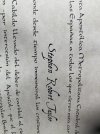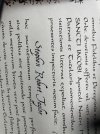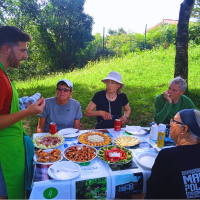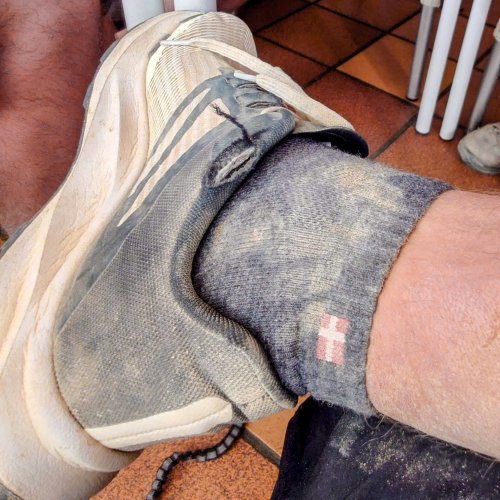In 2021, the Pilgrim Office started collecting all the pilgrim-specific information online, instead of using paper forms on clipboards and pens, shared by many people, and which could cause the spread of COVID. By 2023, they rolled out the planned use of this advance input information to laser print Compostelas and Distancias, using a beautiful calligraphic font.
The net result of replacing rekeying of all that demographic information at the counter, instead of reading it electronically, was to reduce the average time to process one pilgrim at the counter from 7-10 minutes, to less than 2 minutes, pre laser printing, and now about one minute per pilgrim with pre-printed Compostelas and Distancias. Most of this time is social pleasantries to welcome and congratulate the pilgrim.
I confirmed this in 2022 when I worked as a volunteer and ran ad hoc timings on random pilgrim processing on different days, and times of days, at different staff positions. The two minutes was virtually all taken up by searching for the Latin name, then writing the information on the pre-printed Compostela forms.
For now, the "Vicare Pro" add-on is being done by manual annotation at the counter. However, it is being contemplated as an additional data input element for the advance data collection. Click on the question mark to learn about it, then tick a box to choose yes or no, then enter the exact name of the person you are dedicating the Compostela to a drop down box. The result is that the laser printer will add the annotation in a perfect calligraphic font, as the rest of the Compostela. Stay tuned on this one. Changes move differently in Spain. But, eventually, everything works out.
Regarding the use and printing of actual given names, versus Latin equivalents, one must remember that Latin is a dead language. Many names used now, do not have an original Latin root. I specifically recall an American pilgrim named "Todd" who was upset that we could not discern an original Latin root name. It turns out, by questioning that he was christened as "Todd." It was never intended to be a nickname for a traditional name like Thaddeus or Theodore - for which Latin equivalents do exist.
So, if you happen to have a given name for which no Latin equivalent exists, don't blame the system. Consider entering a traditional version of the usual spelling of your name to increase the chance of a database match. For example: "Christie" might be better submitted as "Christine" - resulting in a Latin "Cristina." The database table lookups at literal. They do NOT employ AI concepts and cannot look at the Latin tables flexibly.
Some people have complained about how fast the new system works and how there are no queues at many times of the day. Let me tell you that this is preferable to two-to-three hour waits outside in all weather. Once the pilgrim arrival volumes regularly exceed about 1,500 daily, no amount of human staff could handle the volume. Introducing automated assistance was crucial to the Pilgrim Office and Compostela process keeping its head above water - so to speak.
This was especially true during the extended Holy Year. Presently, the volumes are NOT declining steeply from Holy Year levels, as would usually be expected.
Then, in 2027, we have yet another Holy Year. coming So all the work being done during this interregnum, to develop and improve the automated assist system is vital to ensure that future pilgrims can obtain their certificates in a timely manner.
I have seen and been part of the process at all levels - since 2013, arriving as a pilgrim, and working as a volunteer. I have even made some of the process improvement recommendations that are referenced here. Trust me when I tell you that this is the only way to sustain future growth.
Hope this helps.
Tom




























